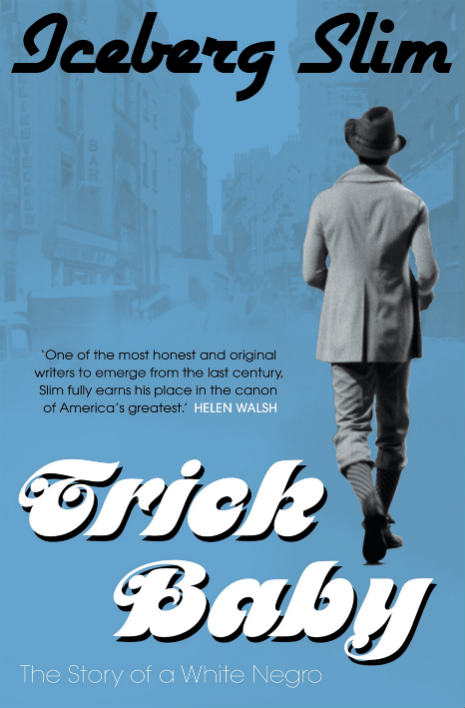
This is odd. Seldom-seen footage of America’s pimp laureate Iceberg Slim, promoting his book Trick Baby and talking about “White Folk,” taken from a 1968 episode of The Joe Pyne Show.
First off, what was Iceberg Slim doing on Joe Pyne? (Joe Pyne = the Bill O’Reilly of the 1960s).
And secondly, what’s with that crazy mask?
This is just a three-minute excerpt from a 49-minute long video that can be watched on Amazon.
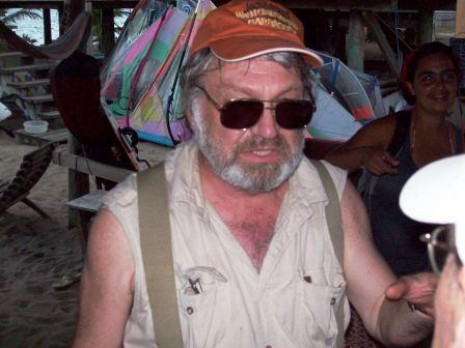
Joe in Hopkins Village
After a vibrant life, Joe Bageant died yesterday following a four-month struggle with cancer. He was 64. Joe is survived by his wife, Barbara, his three children, Timothy, Patrick and Elizabeth, and thousands of friends and admirers. He is also survived by his work and ideas.”
Joe Bageant was an extraordinarily gifted writer and thinker. Author of Deer Hunting With Jesus and countless essays and editorials on politics and society, Joe was a champion of human rights and a fearless critic of our government’s mistreatment of its working class. His writing is imbued with compassion but also a caustic wit that laid bare the working class’s tendency to do what is in their own worst interests. Watching Joe tear into the Teabaggers was like watching an extremely large feral cat play with its food. His death comes at a time when his voice is needed more than ever. I’m not sure there’s anyone out there that can fill the void.
This is not an obituary. I’m not trying to give the reader an overview of Joe’s life in a few paragraphs. I am sharing a few of my memories of Joe as a friend and writer.
The last time I saw Joe Bageant was in February of 2009. He helped save my life. I was in the middle of an agonizing divorce, a divorce I didn’t want. I was struggling with the most profound despair I’d ever experienced, barely hanging on, trying to keep my business, my home and my marriage together. I could see the marriage part was doomed but I held on, pretending to the people who worked for me and my customers that everything was okay. It was a pathetic charade and one that was exhausting to maintain. Between bouts of drinking and staring at walls, I somehow managed to create a theater of normalcy…until I couldn’t anymore. While all my friends were telling me to do the responsible thing, to stick it out for the sake of maintaining control of my business and home, it was an unending nightmare trying to sustain a sense of order while suffering through an emotional apocalypse. Money, the house, the business didn’t mean jackshit to me compared to having someone I deeply loved leave me, and leave ugly, after 18 years of being together. I knew I’d die by drink or my own hand if the pain continued.
It was in the darkest night of my dark night of the soul that I received a phone call from an old friend that I hadn’t heard from in at least a decade. It was Joe Bageant. He had no idea what I’d been going through, but I am convinced that somewhere deep down Joe had heard my sobs and felt my desperation. I told him of my situation and he gave me the only advice that made any real difference. Joe said “Marc, it’s alright to run from your problems.” I repeat, he said “Marc, it’s alright to run from your problems.” He was the only one of my friends to say what I had been thinking and feeling but was too emotionally conflicted to do: get the fuck out of Dodge, and get out now! And Joe backed it up by offering me his beach hut in Belize as a sanctuary. I packed my car and drove to the coffeehouse I owned with my wife. She was behind the counter waiting on a customer. I walked up to her and gave her a long and heartfelt kiss. I said goodbye. I haven’t seen her since.
Joe Bageant wasn’t big on doing the “responsible” things in life. He was big on telling the truth, when he wasn’t making colorful shit up, and he was real big at trying to change the fucked-up world we live in. Joe was responsible in that that he kept gas in the truck and food on the table, but Joe never did anything that he didn’t want to do. He got through life by really and truly being himself. Joe had the Buddha nature. He instinctively knew that life was a richer experience if you didn’t try to control or organize it according to outmoded belief systems. If responsibility entailed compromising your values, your compassion and happiness, then Joe was the most irresponsible man on the planet.
I know Joe made his rep as a progressive redneck with a conscience, but that was only one dimension of a complex and tricky dude. When I first met him in Boulder, Colorado in the early 70s, Joe was living in a converted school bus with his wife Cindy and son Timothy (named after Dr. Leary). On the surface they looked like your stereotypical hippie family. But when they spoke in their sultry southern drawls the words that came out of their mouths weren’t littered with hippie cliches or new age jargon. The Bageant family weren’t Aquarian age Clampetts, they were totally unique and totally magic. Cindy was an oldschool southern gal with the most bodacious Afro I’ve ever seen on a white chick and Joe was some kind of madcap hillbilly visionary. Joe laid the southern thing on thick, mostly to humorous effect. He knew his chicken-fried diphthongs would spook the longhairs who were still re-living the last reel of Easy Rider in their heads. Joe played with people’s expectations, he was a real mindfucker. Like Neal Cassidy, Joe had a sense of playfulness and knew how to drive a bus.
Boulder in the 70s was becoming a mecca for poets thanks to the Naropa Institute’s Jack Kerouac School Of Disembodied Poetics. The streets and bars were crawling with bards and beatniks. Ginsberg, Burroughs, Corso, Creeley, Di Prima, Waldman and dozens of other writers were reading, writing and speechifying in bookstores, schoolrooms and coffeehouses. The Muses had gathered over Boulder like a radiant syntactical cloud, raining down vowels and consonants on tongues of invisible angels. It was impossible to be around the energy of the moment and not think poetic thoughts.
Bageant wasn’t a writer, or much of one at the time. He wasn’t part of Boulder’s literary scene. But, as I would soon discover, Joe was paying very close attention to what was going on and secretly he wanted in. Years later, in an interview with Energy Grid magazine, Joe described Boulder’s poetry vortex and writing in general:
Nobody was sitting me on their knee and telling me the secrets of writing and magicianship. But I was accepted in their company and at parties and got to watch them live their lives creatively and with passion. I came to the conclusion that this writing thing and the arts in general had as much to do with how you lived as anything else. It was clear to me that I should watch and learn from people like Ginsberg, who was the most famous poet on the planet for a reason.
As far as writing goes, I was influenced by all the usual suspects of my generation, Tom Wolfe, Hunter Thompson, Gay Talese, William Styron, Genet, and especially all the Southern writers, Welty, Willie Morris… not to mention a lot of people who never got the respect they deserved, especially poets like Marc Campbell of Taos, New Mexico and Jack Collom of Boulder, Colorado. Their works really clued me in on the connection between words, your brain and your heart.
Joe mentions me in the above quote and I share it not to flatter myself but to give you some insight to Joe’s approach to the whole writing thing. I had no idea at the time that Joe gave a shit about my poetry or anybody’s. In some ways I think he may have actually been embarrassed by the notion of becoming a writer. It was too much of a “scene,” too bourgeois and narcissistic. I never saw him writing. I read him my poems and he would nod and smile and blurt out a “right on” now and then, but I had no idea that he was listening with the ears of a blossoming writer. When Joe eventually sprung his work on me it was jaw-droppingly good, fully formed, inventive and visionary. He worked the southern vernacular up into something that drifted on wings of song.
Poets are a competitive lot, lyrical gunslingers looking to lay waste to the latest hotshot wordsmith that pulls into town. I must admit that, along with just about every local poet in Boulder, Joe’s talent sent me racing to the typewriter to take up the gauntlet he had thrown down. Envy, jealousy and the competitive urge may lack virtue in and of themselves, but they can fuel great works. When poets say they only write for themselves, I respond “bullshit.” Go to any open poetry reading and watch the poets chomping at the bit to hit the lectern and spew their restless poesy. It makes the open mic night at a blues club look like the epitome of brotherly goodwill and graciousness. Joe had quietly been honing his craft in the shadows, but when he finally unleashed his writing it was one glorious monster.
On the one hand, Joe was a down-to-earth, unschooled, self-taught everyman who happened to have a brilliant analytical mind. On the other, he was a cosmic cowboy who had eaten his fair share of good LSD and knew that within the yin and yang of the material world lay dimensions of untold beauty and mystery. Instead of fracturing his point of view, Joe’s multiple and occasionally opposing characteristics played off of each other and deepened his perspective on all things, from the mundane to the magnificent. With the added element of a biting sense of humor and a healthy dose of cynicism, Bageant was son and brother to Lenny Bruce, Paul Krassner and Tim Leary. Eating peyote with Joe was like taking a fast ride down the highway of absolute reality while a hyperkinetic bluegrass band played the music of the spheres on a transistor radio made of human brain matter.
When I spent time with Joe in 2009 he was ill. He had problems with his liver (he had been a drinker in his life) and his energy level was somewhat diminished, but his mind was as quick and lucid as ever. He spoke of the many projects he was working on - his blog, a screenplay, memoirs, columns, essays, etc - and gave no hint that his days might be numbered. The word “cancer” was never spoken, so I assume he didn’t have it then or didn’t want to talk about it. I did detect in Joe a sense of urgency at the time. Upon reflection, it seemed as though he was trying to get as much done as swiftly as possible. He had passed the age of 60 and, along with his liver problems, I think he was very conscious of his own mortality. I was used to seeing Joe operating at a high level, but I was not used to seeing him in states of exhaustion. It’s usually spine-stiffening to see an old friend after years of no physical contact. Those are moments when you’re reminded that we’re not going to live forever and there are no exceptions. Not you, not me, not Joe.
Joe had chosen Belize as a retreat because he liked the small fishing village where he lived. It wasn’t a tourist area. It was dirt poor and Joe felt connected to the people living there. Hopkins Village was founded by Africans who had jumped from shipwrecked slave ships in the 1600s and forged out a life for themselves and defended it against the encroachment of European imperialists. These were Joe’s kind of people - independent and loving life despite hardship and adversity.
I had gone to Belize to cry on a friend’s shoulder, but Joe really wasn’t up for wallowing in pity. I mistook his coolness to my pain as being Buddhist detachment or his own self-absorption. As I said, I understand now that he intuitively knew his days on earth were limited and to waste it on the past, mine or his own, was to squander precious time. He had pulled me out the fire and that was enough. It was time to move on, brother. Losing your life always trumps losing your wife. He had saved my fucking life. What more did I want?
Any day spent with Joe was a spiritual adventure. He was always sparking on all cylinders, a speedfreak without the speed. Fortunately for all of us, Joe finished his memoir before he died. I have the feeling it was just the first volume of others to follow. I can’t wait to read it. Rainbow Pie: A Redneck Memoir comes out on March 30th and you can pre-order it here. Buy it and be happy to get a chance to spend some time with an extraordinary soul.
I have no idea what Joe would have done had he lived another 20 years. But I like the future he imagined for himself:
I plan to have a cottage in someplace like Andalusia, or French Martinique; someplace VERY cheap that I can go and write and snipe at the Republic of terror. One man never beat a mob in its own turf. I’ll stroke my wife’s sweet snatch, pet my dogs and give heart to my children (every one of whom is a good lefty) in some dry place where my arthritic fingers will loosen up enough to learn to play flamenco guitar. I’m serious folks! There is not a person on this earth who can say I never did what I promised… eventually. And every reader here, every son and daughter of good yeoman liberty and decency, as it is defined by the suffering poor of this planet, is invited to come visit, eat tapas and drink wine at my table. Solidarity!”
I drank wine at Joe Bageant’s table and it was sweet and the taste lingers still.
From Joe Bageant’s Lafayette Park Blues:
America: When we first stepped onto this playground of the national soul together, I truly believed you were not a bully, that you were the protector of queers and thick-tongued immigrants and laboring spiritual hoboes like me. I have tossed down your dreams straight from the bottle with no chaser, then bought a round for the house, because this is the goddam land of the free where even a redneck boy from Virginia can dream the dreams of bards, call himself a writer then walk away from dark ancestral ghosts to actually become one.
I believed it all, America. And I still fall for it if I let my guard down, just like the abused wife who believes she will not be punched again for that thousand and first time. All the neighbors — whole nations — believed in you too, despite the muffled screams of the black slave and the Red Indian coming from within your own house. But now you are lurking on the neighbors’ porches smelling of the halls of Abu Gharib and gun grease and there are no cops to call because you ARE the cops, so they are going to break down the doors and cut your balls off.
I can’t sleep at nights and don’t you pretend that you are asleep. Talk to me! You are going to have to say you love your native son or this whole terrible ecstatic thing of ours is over. You have changed over the many years we have been writhing together in this little power struggle of yours and mine — the one between little guy liberty and big authority. Now you have become the police court judge of my days and I dare not even leave your house for a quart of milk or a look at the stars. It’s too late for counseling. You have broken my heart one too many times. Cracked one too many ribs.
Time is short. Dawn will bring nothing good, I promise you.
Speak to me like you used to.
Right now.
Or it’s over.”
There’ll never be another like Joe…but that doesn’t mean we all can’t try. Power to the people and the poets!
In August of 2009 Richard Metzger interviewed Joe Bageant for Dangerous Minds: Deer Hunting With Jesus: Joe Bageant.
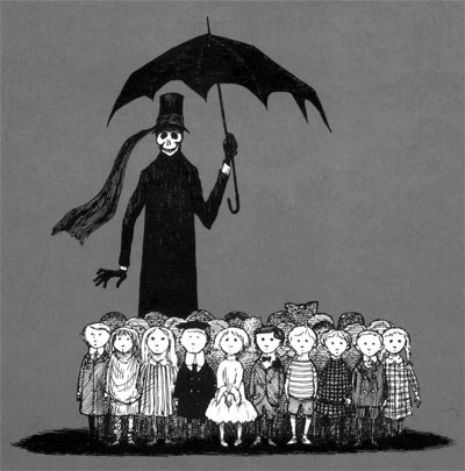
Mark Dery writes in today’s New York Times of the continuing influence of Edward Gorey, author of Amphigorey
and The Gashlycrumb Tinies
. Dery is currently writing a biography of the gruesome author and illustrator, a book the linguistically exact cultural critic seems to have been born to write:
Gorey was born to be posthumous. His poisonously funny little picture books — deadpan accounts of murder, disaster and discreet depravity, narrated in a voice that affects the world-weary tone of British novelists like Ronald Firbank and Ivy Compton-Burnett — established him as the master of high-camp macabre.
Told in verse and illustrated in a style that crosses Surrealism with the Victorian true-crime gazette, Gorey stories are set in some unmistakably British place, in a time that is vaguely Victorian, Edwardian and Jazz Age all at once. Though Gorey was a 20th-century American, he conjured a world of gramophones and cars that start with cranks, of boater-hatted men in Eton collars knocking croquet balls across the lawn while sloe-eyed vamps in cloches look on, and sinister things sink, bubbling, into the reflecting pond. His titles are instructive: “The Fatal Lozenge,” “The Deadly Blotter,” “The Hapless Child,” “The Haunted Tea-Cosy.”
Read more at The New York Times.
Below, Edward Gorey’s iconic opening sequence for PBS’s Mystery! television anthology:
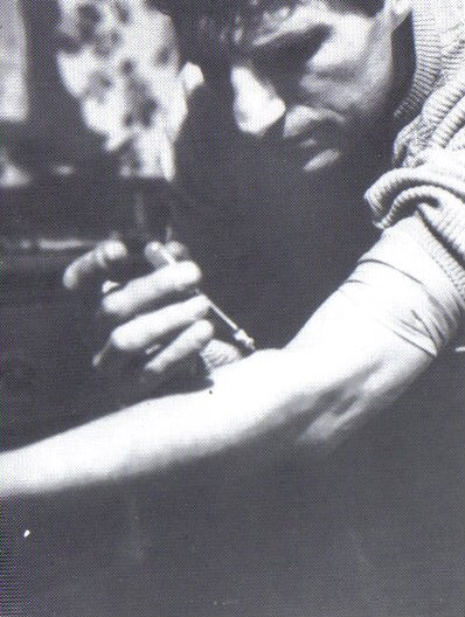
Born in Glasgow in 1925 and reborn in the land of Morpheus sometime in the 1950s, Alexander Trocchi was the beatest of the beat, a self-described “cosmonaut of inner space” who Allen Ginsberg called “a major figure in cosmopolitan new-consciousness fifties’ and sixties’ literature.” Trocchi was a junkie, poet, writer of porn and author of one of the landmark books about being a rebel, drifter and drug addict, Cain’s Book. He wrote it while living in New York and even though it’s billed as a novel, Cain’s Book is based on Trocchi’s own life story. Though banned in the United Kingdom as pornography, it wasn’t the sex that upset the status quo as much as it was Trocchi’s unabashedly anarchic spirit and overall fuck you attitude.
Trocchi’s belief was that a writer should be a pioneer, venturing into areas that ordinary people either were too sane or too afraid to go. His explorations included heroin. Like DeQuincey, Crowley, Baudelaire and Burroughs, Trocchi found a muse in drugs. He was relentless in his pursuit of the next high. And while he might be accused of wearing his junkie status as a badge of honor, he never romanticized the life of the addict. He also never apologized for who he was and what he did, which included turning Marianne Faithfull onto heroin and letting his wife Lyn prostitute herself on the streets of the Lower East Side.
Cain’s Book is the classic late-1950s account of heroin addiction. . . . An un-self-forgiving existentialism, rendered with writerly exactness and muscularity, set this novel apart from all others of the genre.” –– William S. Burroughs
Along with Naked Lunch and Hubert Selby’s Requiem For A Dream, Cain’s Book is a classic of dope-inspired writing. It was Trocchi’s last novel. He spent the rest of his life occasionally writing short stories, prose and poetry. He died of pneumonia in 1984.
I discovered Cain’s Book right around the time I was reading Burroughs, Bukowski and Kerouac. It was another big black splotch on my teenage Catholic soul. Literature was ruining me for the “straight” world but splendidly preparing for a life of sexual adventuring, drug experimentation and the pursuit of my own muses. Trocchi was an imperfect muse himself. But I have discovered that it is the troubled souls that stir up the most heat and though their light is often hidden in the murk of their disheveled lives when it does shine it does so more intensely.
Here’s a clip from the documentary Cain’s Film followed by a short video on Trocchi featuring William Burroughs, Allen Ginsberg and Leonard Cohen.
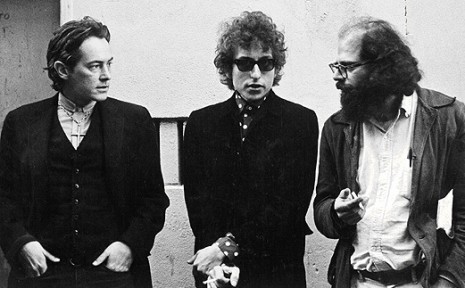
Michael McClure, Bob Dylan and Allen Ginsberg at City Lights Books, 1966
Poet, playwright and novelist, Michael McClure discusses his “poetic processes and experiences with peyote” in this extract taken from the USA Poetry series by Richard O. Moore (1966).
A key figure in The Beats, a mentor to Bob Dylan and Jim Morrison, McClure has just released his latest book of new and selected poetry Of Indigo and Saffron, details for which can be found here.
Via City Lights
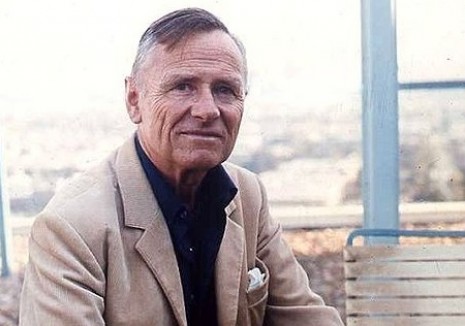
I started reading Christopher Isherwood in my late teens when I became a “paying guest” to an elderly spinster who lived in an old tenement in the West End of Glasgow. She lived in a top floor apartment, where I rented the large front room with a view onto the oval-shaped park below. My landlady was in her late seventies, bird-like, translucent skin, who whistled music hall songs and took snuff in large pinches, sniffed from the back of her hand. She had inherited the apartment from her sister, and the interior had remained unchanged since the 1930s. The hallway with its bell-chimes for Maid, Bedroom 1, Bedroom 2, Parlor, and Dining Room, all still worked. In the kitchen was a range, and a small scullery with its fold-down bed, where a servant would have slept. Coal fires were in all of the rooms except mine. Of course, there was the occasional modern appliance, a TV, a one-bar electric fire, and an electric cooker, which was still in its plastic wrapping, and was “not to be used under any circumstances.” Food was cooked over something that looked like a bunsen burner (what my landlady called “a blackout cooker”), and chilled products were kept in a larder. As for hot water, well that was never available—the boiler was kept under lock and key, and toilet paper was sellotaped to ensure I bought my own. The front door was locked at eight o’clock and the storm doors bolted at nine. After ten, she never answered the door.
At the time, I was reading Goodbye to Berlin which as you can imagine very much suited my environment. Like Isherwood’s character, Herr Issyvoo, I was surrounded by “the tarnished valuables and second-hand furniture of a bankrupt middle class.” A mantel-clock, a heavy glass ashtray, a green baize card table, orphaned figurines of a shepherd boy and shepherd girl tending to their flocks, a large wooden bed (one leg broken) made in the 1920s. But perhaps most significantly was the fact my landlady had worked in Berlin as a furrier for a department store during the 1930s and she often told me tales of her time in Germany. “Oh those Hitler Youth,” she once said, “Such smart uniforms, but the terrible things they did.”
At times it all made me feel as if I was living in Ishwerwood’s world. In the evenings I would hear the whistles out in the park below. But unlike Herr Issyvoo, these were not young men calling up to their girlfriends but neighbors calling to their dogs.
The son of landed gentry, Christopher William Bradshaw Isherwood was born in 1904 at the ancestral seat of his family, Wybersley Hall, High Lane, England. His father was an army officer, who was killed during the First World War. His mother Kathleen had a fractious relationship with her son, and she later featured in his stories.
At school he met and became life-long friends with W. H. Auden and Edward Upward. He attended Cambridge University but found he had no interest in his studies and was sent down for writing a facetious answer to an exam question. It was while at university he became part of the famous literary triumvirate with Auden and Stephen Spender, who were hailed by the Left as “intellectual heroes.”
Instead of studying, Isherwood wrote an anarchist fantasy with Upward, centered around the fictional Mortmere:
...a village inhabited by surreal characters modelled on their Cambridge friends and acquaintances. The rector, Casmir Welken, resembles a ‘diseased goat’ and breeds angels in the church belfry; his sidekick Ronald Gunball is a dipsomaniac and an unashamed vulgarian; Sergeant Claptree, assisted by Ensign Battersea, keeps the Skull and Trumpet Inn; the mannish Miss Belmare, domineering and well starched, is sister to the squire, and Gustave Shreeve is headmaster of Frisbald College for boys.
Though none of the stories were published at the time (and Upward destroyed most of them later on), it was the start of Isherwood’s writing career, and led on to his first novel All the Conspirators in 1928.
Stifled by England, Isherwood followed in his friend Auden’s footsteps and moved to Berlin. It proved an historic re-location, one that inspired the first of Isherwood’s important novels Mr Norris Changes Trains and Goodbye to Berlin. Literature aside, Isherwood’s main reason for going to Berlin was “boys” - blonde, working-class youth.
Isherwood supported himself in Berlin by working as an English tutor, and he used this experience to form the basis for his Berlin stories, and the creation of his eponymous central character. “I am a camera,” Isherwood famously wrote at the start of Goodbye to Berlin, for he saw Herr Issyvoo as “unobtrusive, sexless,” someone who could only observe, and examine the lives of those around him. When later asked why he had not been more explicit about his character’s homosexuality, Isherwood said that if he had come out, then it would have been “a production,” something that would have “upset the apple cart” for the other characters. The poet Stephen Spender claimed Isherwood once claimed he couldn’t imagine how people behaved when he was not in the room.
During all this, Isherwood continued to write novels, most notably Prater Violet, based on his first dealings with film-making and the rather brilliant, but under appreciated, Down There on a Visit. On a more personal note, in 1953, he met Don Bachardy, the man who became his life-long partner.
In the sixties, Isherwood achieved considerable success with his “devastating, unnerving, brilliant book” about middle-age, A Single Man. The novel’s central character George, is like Isherwood, and describes a day in his life, when he no longer fears annihilation but survival, and all the debilitating side affects old age will bring. Isherwood said the book was about:
“...middle age, because what I wanted to show was the incredible range of behavior in middle age, part of the time one is quite tending towards senility, and other times one is rash that is way a way boyish, and apt to indulge in lots of embarrassing behavior, at the drop of hat.”
In the 1970s, Isherwood returned to the Berlin of his youth with his autobiographical memoir Christopher and His Kind, it was a crowning achievement to a literary career that had already delivered at least three or four of the twentieth century’s best novels.
Gore Vidal has said Isherwood is “the best prose writer in English,” which is perhaps true as Isherwood’s writing is subtle, clever and is always fresh, even after repeated readings.
This documentary A Single Man: Christopher Isherwood 1904-1986 was made not long after his death and composed from a selection of interviews from British TV from the 1950s-1970s.
For fans of Isherwood, the BBC has just completed a drama Christopher and his Kind, adapted from Isherwood’s book, starring Matt (Doctor Who) Smith in the title role, which will be broadcast later this year. Further information can be found here.
The rest of ‘A Single Man: Christopher Isherwood 1904-1986’, after the jump…

Denis Johnson is one of the finest living writers in America and has been for a few decades now. His 1992 short story collection Jesus’ Son is firmly planted in my top ten favorite books. If you haven’t read any of his work, I highly recommend the novels Angels, Already Dead: A California Gothic , Resuscitation Of A Hanged Man and the aforementioned Jesus’ Son. For fan’s of Jack Kerouac, Robert Stone and Thomas Pynchon.
In this video shot at Cornell University in 2009, Johnson reads from The Starlight On Idaho, a short story originally published in Playboy in 2007.
The Starlight On Idaho describes a family of criminals & maladjusted characters. Narrator is Mark Cassandra - in a rehabilitation center because of alcohol addiction, & story is in the form of a series of often imaginary letters to various people (including to Pope, Satan, & I think god himself too!) Title of the story comes from the name of rehab center: Starlight Addiction Recovery Center, Idaho Avenue, Ukiah, California.
There’s a touch of Richard Brautigan in this.
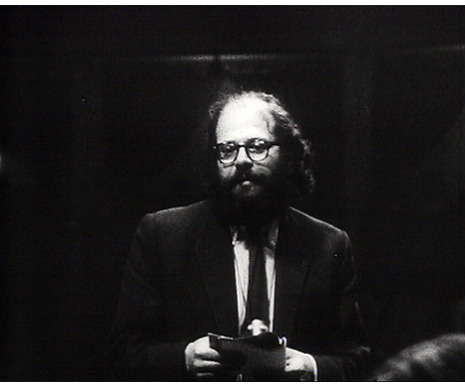
British film maker Peter Whitehead chronicled London’s sixties counterculture scene in Tonite Let’s All Make Love in London and the seminal rock and roll of the decade in videos and documentaries for The Rolling Stones and Jimi Hendrix. What Whitehead did for pop culture, he did for poetry in the combustible Wholly Communion.
On 11 June 1965, the Royal Albert Hall played host to a slew of American and European beat poets for an extraordinary impromptu event - the International Poetry Incarnation - that arguably marked the birth of London’s gestating counterculture. Cast in the role of historian, as a man-on-the-scene, and massively elevating his limited resources, Whitehead constructed the extraordinary Wholly Communion from the unfolding circus. As Allen Ginsberg, Lawrence Ferlinghetti, Gregory Corso, Harry Fainlight, Alexander Trocchi and others took to the stage, Whitehead confidently wandered with his borrowed camera, creating a participatory and anarchic film that is as much a landmark as the event itself, and launched his career.
When poets were rock stars. Enjoy Wholly Communion in all of its delightful chaos.
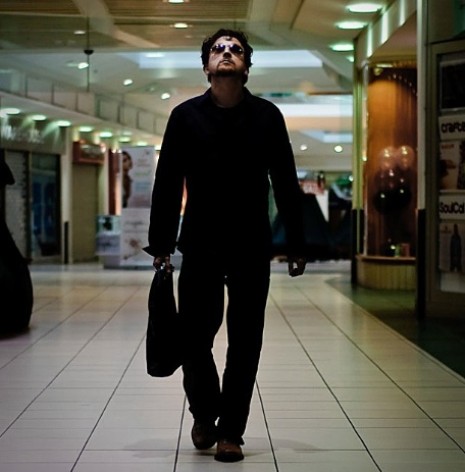
The novelist Ewan Morrison came to prominence in 2005 with his excellent collection of short stories The Last Thing You Read. Since then, Morrison has written three novels, Swung, Menage and Distance, which are amongst the best new fiction published in the UK over the past decade, and if you haven’t already, do go read him.
Ewan’s a clever man, a former TV Producer and Director, who has now created Tales from the Mall, a project he describes as ‘a book of short stories and facts about shopping malls, it’s a compilation of aural history and urban folklore; it’s also an ongoing video project. It might turn out to be a new kind of book app.’
Over the past few months, Morrison has been interviewing staff at various malls thru-out Scotland and the north of England - cleaners, car park attendants, retail agents, designers, town planners and security guards:
‘...recording their tales, confessions and anecdotes and on the way discovering a lot about how the modern world actually works and how consumerism effects and transforms people on a subconscious level.
‘People actually love shopping, and hate themselves. The two things are connected.’
He has compiled this information into short stories, some of which he has made into animated video clips. Now, in an exclusive interview with Dangerous MInds, Ewan discussed his thoughts, ideas and ambitions for Tales from the Mall:
‘I know that Malls sound boring - it must seem a bit like writing about airport terminals or trains stations, but it’s not. Malls are, it turns out, one of the most important subjects in the world. They are really the homes for the worlds leading multinational corporations and are portals to the non-space of globalisation.
‘Malls create cultural conformity and eat away at the values and traditions in all countries they move into. They also spread virus like. GAT, NAFTA, the IMF, the World Bank – these international trade and loan agreements are all about malls. “We will give you this billion dollar loan on the condition that you privatize certain tracts of land and facilitate these corporations” – that’s how Malls spread.’
This spread has been aided by recent political and cultural events.
‘Since the fall of the Berlin Wall the developing world has been hit by a shopping mall pandemic, while ironically in the US malls have started dying-out at capital moves east and the US landscape has surpassed the point of retail saturation. The UK jumped on the bandwagon in the Thatcher era, and now is building new malls to deal with the problems caused by malls.
‘Malls are not just places where some people shop. Malls are all about temp labor and sweatshops and unsustainable resources being repackaged into cycles of planned obsolescence. Malls are about the artificial manipulation of desires and the expansion of sexualised youth culture into our daily lives. They are about making everything including people, increasingly disposable. They are about living on credit and working in repetitive jobs that make you desire an escape. You see, this is fascinating.’
From his many interviews, Morrison has uncovered what he describes as some “astounding” things. For example, the “check-out girls” or “till Jills” suffer from high instances of deja-vu and amnesia; mall car parks are often used as a “try-out space” by some transvestites; malls have even become a safe, go-between space for divorced parents to hand the kids over to each other on restricted visitation times.
‘I’ve also come up with a theory about how consumerism is encouraging divorce, and how the sexualisation of retail has resulted in malls being magnets for extreme behaviors.
‘These are important facts of recent history, which can only really be told through the medium of storytelling. I’ve quite simply been retelling other peoples tales, in much the same way Dave Eggers did with Zeitoun.’
But Morrison has been doing more than re-telling tales, he has also invited stories, poetry and videos from the public, via his site and through The List magazine, all of which have been ‘eye-opening, very telling and moving.’
‘One is about losing virginity, another is about losing a child, another is about shoplifting, and another still is a poem inspired by a mall fountain. I’d like to get more of these coming in.
‘Doing this project shown me the hundred small ways that people resist and modify consumerism in positive ways every day, even those at the bottom of the pecking order who clean up other peoples crap from shopping mall floors. Some of the funniest and deepest tales have come from cleaners and car park attendants. The biggest discovery of all is that mall workers have really funny, dark stories to tell, and that storytelling is a really big part of how they make their anonymous, repetitive jobs bearable.
‘So as well as stories that I’ve re-told, and a few I’ve made up, the idea is to have a book- as-portal, which has at its core nine key stories (named after retail outlets) and around that people can contribute their own mall tales into a growing archive which is open ended and open access.’
This possibility of an app for the project means the book ‘would keep growing over the years as new audio, video and written material comes in from other people. After a decade the thing could be immense.’
‘The idea however is not to castigate, critique or damn shopping malls. but to treat them as a culture in much the same way that historians and archivists treat dying tribes or folk songs. I’d originally thought that Malls might prove barren ground – that really consumerism is empty and has no stories to tell – but I turned out to be wrong. There’s an amazing diversity and richness in people’s mall tales.
‘Over time I realised I wanted to dig out the history of malls and how they’ve come to dominate the globe, and it turned out no-one had actually compiled a decent and readable history yet. So that too has become part of the project.
‘The history of the mall is really the history of American style capitalism. On the local level, I was amazed how the self identity of my city - Glasgow - is blind to it’s own reality. People from Glasgow still tend to look back with nostalgia’s soft focus to the days of heavy industry on the River Clyde. The fact is that Glasgow has had a life post-post industrial decline. It is perhaps because Glasgow is so full of old communists that the reality has not been accepted – Glasgow is now the UK’s leading mall city. It has the second largest amount of retail space per head, next to London; it has five vast malls, one on each of its tributary roads. Its central street is the only one in the UK that has a mall at either end, which makes it “the seventh largest retail avenue in the world”. So part of my project has been to own-up to the fact that Glasgow is incredibly consumerist, and to find out how the city came to be like this and how it operates. How it effects people.’
Ultimately, Morrison believes the mall will die out:
‘I predict that Malls will start shutting down in the UK, as they have done in the US, and also that we will start to see malls targetted with violence, vandalism and political demonstration in the coming years of austerity– as people look for a representative symbol to blame and attack. Bricking a building is easier than attacking a brand logo. Malls in Europe will burn, as the department stores they put out of business burned back in the late 80s.’
If you have any stories, comments or would like more information about Tales from the Mall then check here.
More ‘Tales from the Mall’ after the jump…